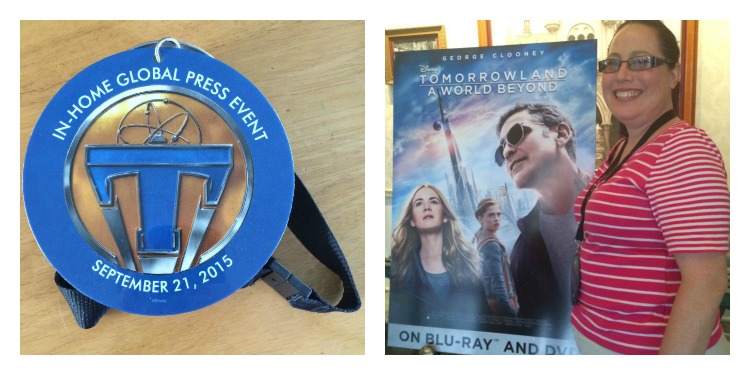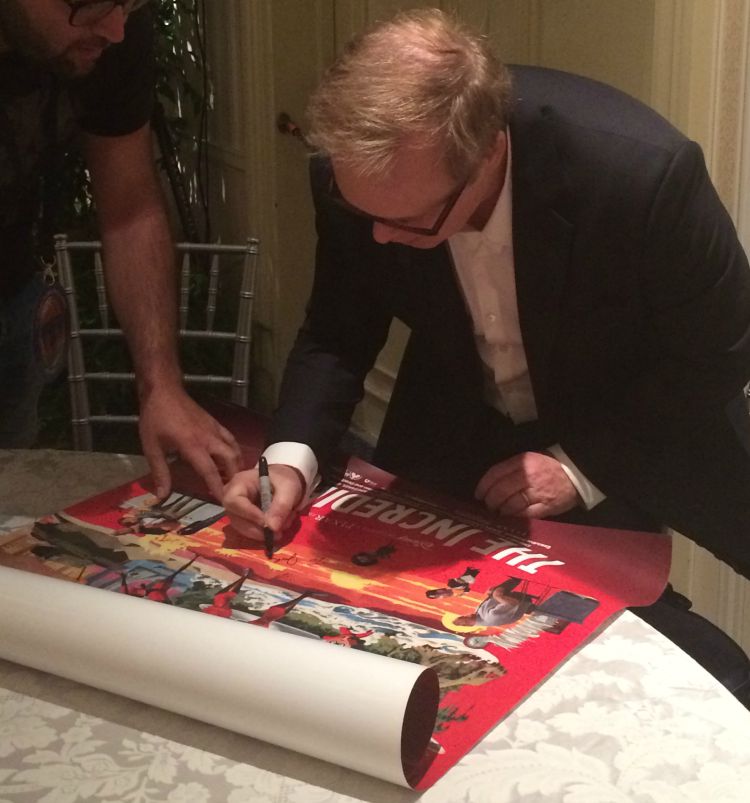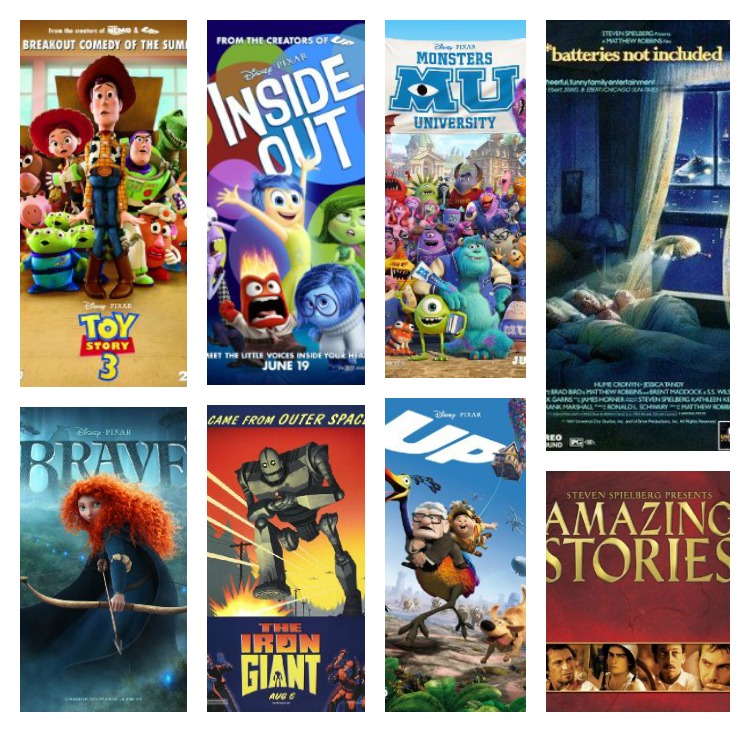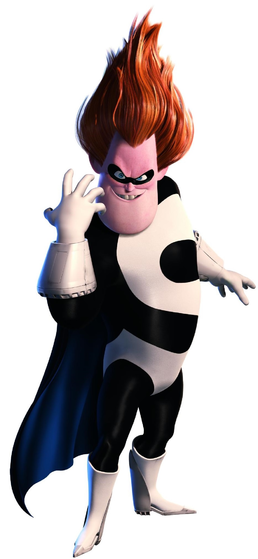On September 21, Debtfreespending.com was specially selected to attend a monumental press event at Disneyland in California:
Disneyland 60th Diamond Anniversary Celebration
Disney Tomorrow Interview with ‘Athena’ and ‘Young Frank’
Disney Dreamers Behind the Scenes
Meet Eric Goldberg, the Genius Behind the Genie in Aladdin
We had an amazing and dreamlike experience, being surrounded by such talent and Disney magic.
To continue celebrating the Blu-Ray, Digital HD, and Disney Movies Anywhere release of Tomorrowland on October 13:
We had the privilege of sitting down with the phenomenal director/writer/producer of the summer hit, Tomorrowland.
Brad Bird has been involved in more projects than you might be aware of. His more familiar work includes:
The Incredibles (2004) – Director / Writer
The Simpsons (1989) – character designer / character layout artist / director / executive consultant / sheet director, Ratatouille (2004) – director / screenwriter
Did you know he was also involved in:
Oscar-winning writer and director of “Ratatouille” and “The Incredibles”, Brad Bird continues to work on his various projects, which you can learn more about in our interview:
Q : Is it true that The Incredibles character, Syndrome, was designed after you?
BB : Unfortunately it’s the bad guy, right? Tony Fucelli and Teddy Newton were the character designers in the movie and I think thought that was a good idea. The last person who can see yourself is yourself?
We were well into production and the model had crazy hair everywhere. I don’t have crazy hair. And I don’t have delusions of taking over the world. So, I didn’t’ see it until it was too late and then I was like “yeah, you jerks, yeah. Very funny.
Q : I have been a huge fan of yours since Family Dog (1987), memorized the whole thing, and wore out my VHS tape at the time.
 You have worn so many different hats since then and accomplished many different things. What would you like to do that you haven’t done yet?
You have worn so many different hats since then and accomplished many different things. What would you like to do that you haven’t done yet?
BB : I have several movies over a period of about 10 years in development hell. Where I was, I could always sell an idea to a studio pretty readily. Then I was in the realm of Vice Presidents who didn’t have any power to get anything made. So, Hollywood loves “Maybe” because, “maybe” keeps you from going anywhere else, but “maybe” also means they don’t have to make it. So they like to keep you around and kind of as a sort of “prisoner in a white collar prison,”.
When I started out in movies I loved “yes”. I liked “maybe” and I hated “no.” After a few years, I learned to love “yes” and “no,” and hate “maybe” because “maybe” takes years of your life away and doesn’t give you anything at the end of it.
Several movies and ideas that I really love and believe in are at different studios and I can make them maybe, but I have to go to those studios. I can’t shop them around, they are there.
That can be a good thing – if they’re good people at the studio, then that’s great. But, I have several projects that I really wanna make. I also enjoyed returning to The Incredibles and being able to do that for a little bit too.
Q : Have you begun working on ‘The Incredibles 2’?
BB : Yes, we’re in the early stages of it.
Q : What was the inspiration behind ‘Tomorrowland’?
BB : I was at the very end of Mission Impossible – Ghost Protocol and we had tested very well, but there were some things in the story that I was not happy about. Fortunately we worked efficiently and we were still a little bit under budget. If we were really surgical and careful, we could fix the things that I wanted to fix. Damon Lindleoff came in to help me fix the writing in a couple of these things. Some of them were tricky because we had to use a lot of stuff that we’d already done and had to fit in but also solve some problems. I was working with him and we were having lunch and I asked him what he was doing next and he mentioned this project.
We fell into a conversation about how we viewed the future when we were kids. The “popular vision of the future” versus “the vision of the future now.” When we were kids, the world was not a better place – there were race problems, there was Vietnam, there were assassinations, there was the Cold War… There were plenty of bad things going on. But somehow, people managed to hold up a positive vision of the future and that we were gonna solve all these problems and get there. Somewhere in the intervening years, that vision got corroded into “it seems to be that the only credible vision of the future that people will take seriously now, is a dark vision of the future”, where resources are gone and the planet is ruined and that we’re all on a road to Apocalypse.
That seems to be the only version that people take seriously now. We wondered why did that change and could we make a sort of “fable” about asking that question? Is there another way to see the future and I think that we all have a hand in making that future. If we resign ourselves to this “other future” then it will happen. But if we say that “No, we, we’re actually in charge of the future, all of us, and that if we set our sights to something different we can get there.”
Q : There’s some anticipation about seeing what Tomorrowland’s gonna look like. Did you want to show more of Tomorrowland in a film?
BB : I think ideally you kind of want to because it’s a fun place. But the story that we were telling, was more of a road movie. In retrospect maybe the title shouldn’t have been Tomorrowland, but it’s a great title. I think that it led people to expect a movie that took place entirely in Tomorrowland and was just “fun, fun, fun, fun, fun.” And we kinda said, “What’s the problem? What’s the problem? It can’t just be fun, fun, fun in Tomorrowland with people jumping on trampolines that shoot you a mile in the air,” and, a jet pack parties. There has to be an arc to the story and there has to be a resistance. We somehow have to get to the subject that intrigued us, which was “Why did the vision of the future change and can we make a fable about that?”
It always was a road movie, but we probably could’ve talked about that earlier. I didn’t want to say what the movie was, before people saw it. But I think in some ways the movie was a prisoner of its expectations about what people thought it was going to be, and then when it wasn’t that, about half actually, got angry. The other half was willing to take the journey that we laid out and see it for the movie that we meant it to be.
I’m interested to see the only critic who’s reliable 100% of the time. Time. I’m anxious to see how it is perceived when it’s free of the expectations of it. When people just stumble across it like I’ve stumbled across some of my favorite movies, not knowing anything about it, and just say, “What’s the first scene? What, oh that’s interesting, where’s that gonna lead?” And just lets the story be told. I wonder if it’ll be perceived differently.
Q : I remember the first time I saw the trailer. I hadn’t heard anything about it. It just kinda came outta nowhere and this girl looks like she’s coming out of jail, “What is this story?” And then all of a sudden, she touches the button and she’s transported. The whole audience was like, “Whoa!!” And she turns around and sees the city.
You could just feel everybody getting it at the same time and it was really neat to be in a room full of people that kinda all clicked in at the same time. That was really exciting.
BB : The weird thing is if you have a complicated idea you then have to figure out, “How do you explore it in an uncomplicated way?” And a series of simple statements can add up to a complex idea, which is all in the gray area between the things that you’ve done, if it provokes thought – that’s a good thing. But I think that it was the contrast of the gray enclosed low-ceiling quietly dull place and suddenly feeling light in space and a destination. There’s something that in that room that felt like there was no destination and suddenly you’re at a place where there is a destination.
That’s kind of, in a nutshell, what we’re trying to do in sort of an abstract symbolic-y way to say, “We’re kinda prisoners in a view of the future.” And right that close to us, is this other future. It’s only a click in our mindset and that doesn’t mean that we aren’t gonna encounter a lot of obstacles, as our heroes do. You will encounter lots of obstacles. There are people that have vested interest in this other thing that you don’t want and you have to encounter them. But that’s like any fairytale, that’s like any myth and we wanted to do a fable about that idea. We’ll see how Time treats it.
Q : My family just saw a movie that said that you can actually do anything, you just need to believe.
BB : I think what we were also trying to say is that “imagination is important but it’s only the first step.” It’s what gets you in and somebody at the other table said, “Why when at the end of the movie when everybody touches the pin, why are they in the field and not in Tomorrowland? And I said, “It’s because you try to just let it live in the land where it sparks thoughts in people without telling them an interpretation. We made a conscious effort to put Tomorrowland there and you’re not there.
You have to take steps. You have to take a journey. It’s there, it’s in sight. The idea of the pin was that people would be implanted with the vision of this place and then work to pursue it. If you imagine it, it’s great, but don’t let it end there. Too many people imagine and go, “Oh well,” the next morning instead of going, “That dream actually could happen. It’s gonna take a heck of a lot of work, but it can happen.”
Q : Well, I’m curious to see how this movie does in Japan where there are so many different people that have creativity but the culture itself is a little more stifling.
BB : You never know… Avatar had an impact in China. People were seeing things in it that weren’t there on the surface but were underneath. I remember hearing another story about Titanic making a huge impact in China. Women were suddenly going, “You mean a man would kill himself to save a woman?”
Like, “I can’t believe that. This guy actually gives up his life for this woman, how could that be?!” And it’s like, “Uh oh,” You’re gonna have to deal with that now. And that’s good, though. That’s exploring what it means to be alive and that’s what storytelling is all about.
– – – – – – – – – END OF INTERVIEW – – – – – – – – – – – –
BONUS: Video Clip Lightening Round Interview with Brad Bird







Leave a Reply